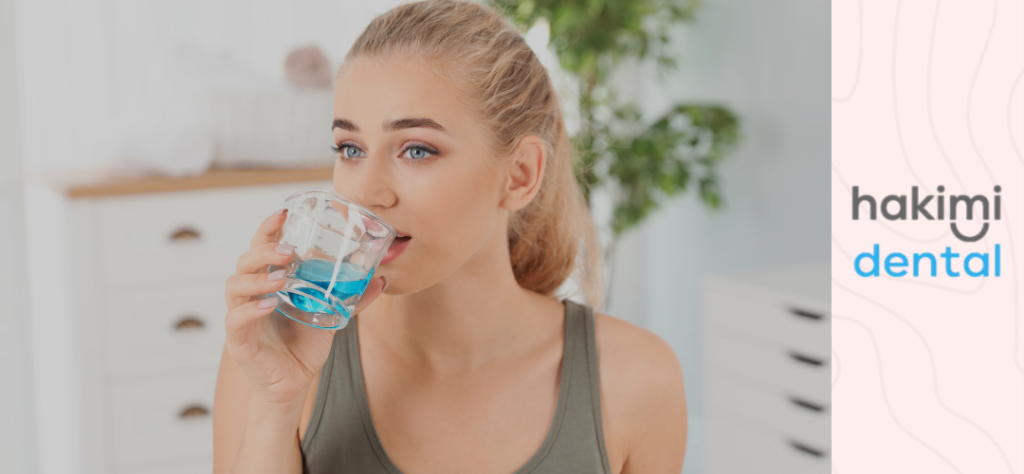Is Mouthwash Bad for You?
Mouthwash is a common household item, often used for a quick freshen-up. But beyond its ability to combat bad breath, mouthwash plays a significant role in overall dental health.
This blog aims to clear up confusion and answer common questions, such as “Is mouthwash bad for you?” and “Should you use mouthwash before or after brushing?”. Let’s take a closer look and understand its place in our daily oral hygiene.

Understanding mouthwash and its role in oral health
Mouthwash isn’t just an accessory to your oral care routine; it’s a key element. It can reach places that your toothbrush can’t, helping to reduce the risk of dental problems. But it’s not just about swishing any mouthwash; choosing the right type and using it correctly are crucial for its effectiveness.
Different Types of Mouthwash for Different Needs
There are generally two types of mouthwashes: cosmetic and therapeutic.
Cosmetic mouthwashes offer a temporary solution to bad breath.
Therapeutic mouthwashes contain active ingredients targeting oral health issues like gingivitis, plaque, and tooth decay. Some also contain fluoride, an essential mineral for fighting tooth decay.
Exploring safety concerns: how safe is mouthwash?
In essence, the safety of mouthwash hinges on its proper use and understanding of its ingredients.
When used according to the guidelines provided, mouthwash is generally safe and can be an effective part of your oral care routine. It’s also crucial to select a mouthwash that aligns with your specific oral health requirements, whether it’s for sensitive teeth, gum health, or to combat bad breath. Understanding what’s in your mouthwash and how it works helps in making an informed choice, ensuring that you reap the benefits without unwanted side effects.
So, the answer to “Is mouthwash bad for you?” is “No, if used correctly.“.
Timing matters: should you use mouthwash before or after brushing?
A common question in oral hygiene is about the best time to use mouthwash – before or after brushing teeth. While opinions vary, the prevailing advice from dental experts leans towards using mouthwash after brushing.
The reasoning behind this is quite straightforward. Brushing your teeth with fluoride toothpaste leaves a protective layer of fluoride on your teeth. Using mouthwash immediately after brushing can help maintain this layer, as opposed to rinsing it away if used beforehand. This approach ensures that the fluoride continues to protect your teeth for a longer period, bolstering your overall oral health.
To maximise the effectiveness of mouthwash, it’s advisable to use it after completing your brushing and flossing routine. This sequence aids in clearing out any residual particles and bacteria, ensuring a thorough clean. Remember, though mouthwash is a helpful tool in maintaining oral hygiene, it should be used in conjunction with, rather than as a replacement for, regular brushing and flossing.
Mouthwash's role in tackling bad breath: a short-term fix
While mouthwash is effective in offering a quick fix for bad breath, it’s important to note that it’s not a long-term solution. If you’re experiencing continual issues with bad breath, it could be a sign of deeper dental problems that require attention. Maintaining good oral hygiene and scheduling regular dental visits are essential steps in addressing the root cause of persistent bad breath.
Essential tips for safe and effective mouthwash usage
To ensure you’re using mouthwash safely and getting the most out of its benefits, consider these extended guidelines:
Follow label instructions carefully: Each mouthwash comes with specific instructions for use. Pay close attention to these guidelines, as they are designed to maximise the product’s effectiveness and ensure safety.
Avoid swallowing mouthwash: It’s crucial to avoid ingesting mouthwash. If you do swallow a significant amount, especially mouthwashes containing alcohol or fluoride, seek medical advice immediately. This is particularly important for children, who may be more prone to accidental swallowing.
Use mouthwash as an addition, not a replacement: Mouthwash is intended to be an adjunct to, not a replacement for, brushing and flossing. It can reach areas that brushing alone might miss and can offer additional protection against bacteria and plaque, but it should not be considered a standalone solution for oral hygiene.
Consult your dentist if In doubt: If you’re unsure which mouthwash to use or how to incorporate it into your oral care routine, consult your dentist. They can provide personalised recommendations based on your oral health status and needs.
Safely introducing mouthwash to children's oral care
When it comes to children, the use of mouthwash is usually advised for those aged six and older. It’s important to select a mouthwash that is specifically formulated for children, as these are typically alcohol-free and have milder flavours. Supervision is key when children use mouthwash to prevent them from swallowing it. This not only ensures their safety but also helps them learn the correct way to use it as part of their daily dental hygiene routine.
Conclusion
Incorporating mouthwash into your daily dental care can offer significant benefits, enhancing protection against dental issues and contributing to fresher breath. However, it’s essential to view mouthwash as one part of a comprehensive oral health strategy. This strategy should encompass consistent brushing and flossing, the judicious use of mouthwash, and regular visits to the dentist.
Together, these practices form the cornerstone of maintaining optimal oral health.
FAQs
Typically, swishing mouthwash for about 30 seconds to a minute is recommended.
Most mouthwashes are designed for daily use, generally twice a day.
Mouthwash can temporarily mask bad breath, but it’s not a permanent cure. Persistent bad breath might indicate underlying dental or health issues, requiring a dentist’s attention.
Yes, there are mouthwashes specifically designed for sensitive teeth. They can help reduce sensitivity and provide additional fluoride protection.
Natural mouthwashes, often containing ingredients like aloe vera, tea tree oil, or chamomile, can be effective for some individuals. However, it’s important to choose a product that meets your specific dental needs.
